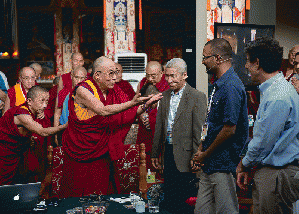Positive Psychology aims to explore the positive aspects of being human-- happiness, well-being, compassion, awe, kindness, love, civility-- and it uses some languaging, like savoring, elevation, broaden and build, eudaemonia.
This is exciting work. There have been trillions spent on the negative aspects of being human, hate, war, anger, greed-- so it's good that now there is a rapidly growing field that seeks to understand the psychology, neurobiology and underpinnings of what is good about people.
There are games being created based on the research, theories of what make good movies based on it, school programs built from the ground up with positive psychology principles.
Research shows that when people learn the skills that positive psychology has identified as worth learning, people feel better, are healthier and may even live longer-- and certainly happier lives. They show more compassion, take action and help others. One researcher, Robert Vallerand, explored the idea of passion-- proposing that there are two kinds-- obsessive, which can be unhealthy, and harmonious passion, which can actually enhance well-being and health.
Richard Davidson, a neuroscientist at University of Wisconsin, Madison, has been doing and directing research inspired by his relationship with the Dalai Lama.
He's studied Tibetan Buddhist monks who have engaged in at least 10,000 hours, and an average of 34,000 hours of Loving Kindness meditation. He and his team have identified the parts of the brain that light up when the monks achieve higher states of consciousness. The goal of the mediation is to generate a state in which love and compassion permeate the whole mind.
Davidson concludes, "Compassion, kindness, mindfulness, and other related characteristics are best viewed as products of trainable skills. Mental training to enhance these skills changes the brain and body.
After his lecture, I asked Davidson, who I first met in 1979, about an interest of mine, the heartwarming experience-- when you have glow or warm feeling in your heart. That phenomenon was what set off my interest in positive psychology 30 years ago. He speculated that these monks who spend tens of thousands of hours practicing loving kindness meditation may be in an almost permanent state like the heartwarming experience.
The exciting thing is, his lab has shown that it doesn't take 10 or 20 or 30,000 hours to learn enough loving kindness meditation skills to make and feel a difference.
There were hundreds of reports, presentation, papers, posters, panels and workshops at the congress. This article gives a tiny sampling.
Rob Kall is an award winning journalist, inventor, software architect,
connector and visionary. His work and his writing have been featured in the New York Times, the Wall Street Journal, CNN, ABC, the HuffingtonPost, Success, Discover and other media.
Check out his platform at RobKall.com
He is the author of The Bottom-up Revolution; Mastering the Emerging World of Connectivity
He's given talks and workshops to Fortune
500 execs and national medical and psychological organizations, and pioneered
first-of-their-kind conferences in Positive Psychology, Brain Science and
Story. He hosts some of the world's smartest, most interesting and powerful
people on his Bottom Up Radio Show,
and founded and publishes one of the top Google- ranked progressive news and
opinion sites, OpEdNews.com
more detailed bio:
Rob Kall has spent his adult life as an awakener and empowerer-- first in the field of biofeedback, inventing products, developing software and a music recording label, MuPsych, within the company he founded in 1978-- Futurehealth, and founding, organizing and running 3 conferences: Winter Brain, on Neurofeedback and consciousness, Optimal Functioning and Positive Psychology (a pioneer in the field of Positive Psychology, first presenting workshops on it in 1985) and Storycon Summit Meeting on the Art Science and Application of Story-- each the first of their kind. Then, when he found the process of raising people's consciousness (more...)






